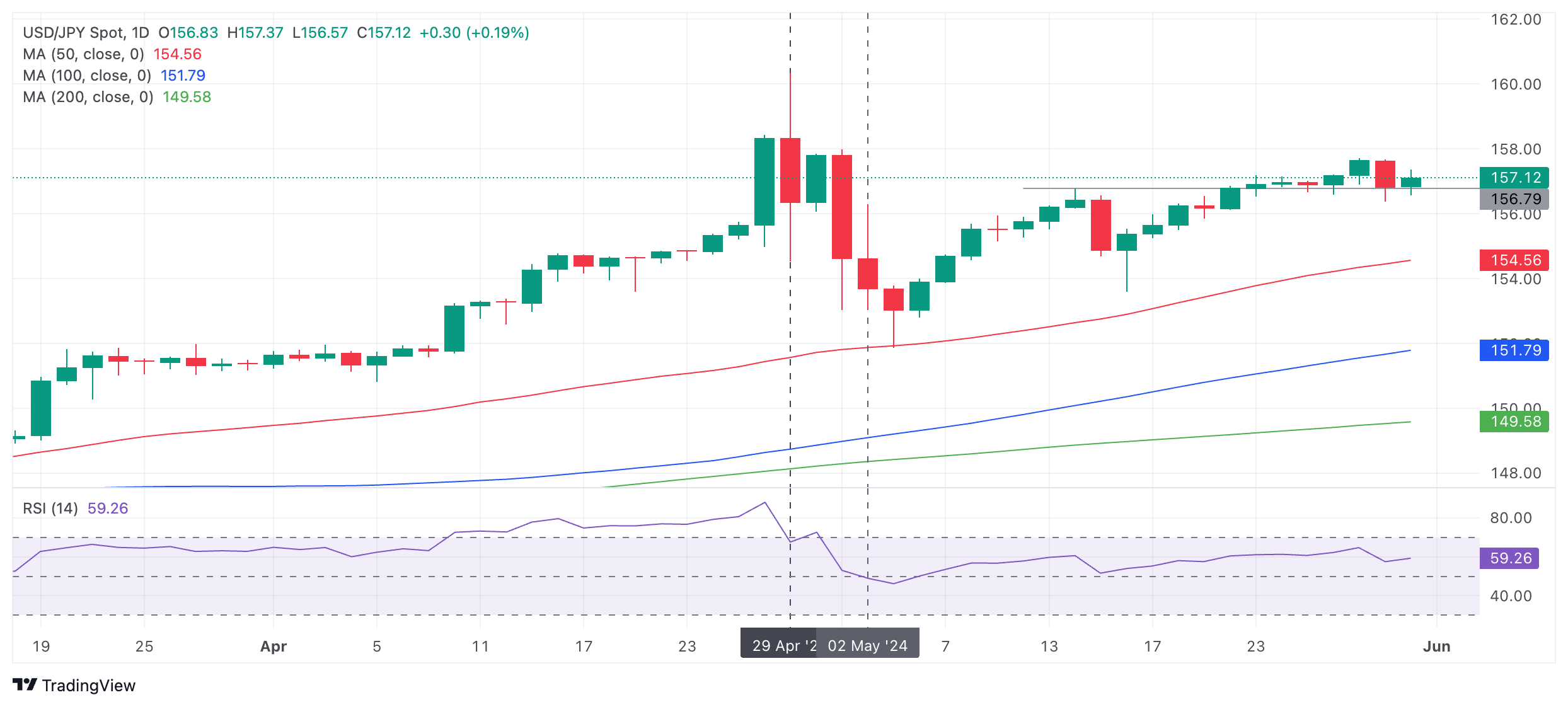USD/JPY is likely to remain underpinned by lack of options in Japan
- USD/JPY is likely to remain underpinned as the Bank of Japan has few options for sustainably strengthening the Yen.
- Direct intervention is only a quick fix and needs support from higher interest rates to work sustainably.
- The pair is likely to be a Dollar-affair with any declines resulting more from USD weakness rather than JPY strength.
USD/JPY is likely to be a one-sided marriage with the US Dollar (USD) dominating the partnership, according to analysts. Any declines are likely to result from USD weakness rather than JPY strength
The Japanese authorities are being forced to take drastic measures to prop up their currency due to concerns about the negative impact of a too-weak Yen on Japanese businesses. The little strength the Yen has mustered in April and May has been due to direct intervention in the FX markets by the Bank of Japan (BoJ).
Record interventions
Data released by the BoJ this week shows it bought a record ¥9.8 trillion between April 29 and May 29 and intervened twice during this period – on April 29 and again on May 2.
USD/JPY Daily Chart

USD/JPY has steadily drifted higher since the May 3 low of 151.86 just after the BoJ’s second intervention, proving intervention only had a short-lived effect.
To be truly longlasting direct intervention would need to be coupled with tighter BoJ policy, or higher interest rates. Higher interest rates make a currency more attractive to foreign investors as a place to park their capital, attracting greater inflows.
“The second intervention drove USD/JPY from 158 down to 153, but the pair has since rebounded to trade near 157.30 currently. Until the BOJ outlines a more hawkish tightening cycle, the Yen is likely to remain weak. That said, the interventions have stabilized the yen in a 155-160 range, at least for now,” say analysts at Brown Brothers Harriman (BBH) in a note on Friday.
At between 0.0 - 0.1%, the base interest rate in Japan, set by the BoJ, is one of the lowest in the world. This explains the Yen’s persistent depreciation. Whilst inflation has risen sharply in most of the rest of the world post-Covid – resulting in most central banks putting up interest rates – in Japan this has not been the case. The result is the country’s currency has fallen like a stone.
Bank of Japan board member Adachi Seiji said this week that the BoJ could raise interest rates purely to strengthen the Yen, however, analysts say this would be a mistake.
“The rate hike could be seen as a mistake if it comes at a time when inflationary pressures are lacking and the economy is weak. The markets are already showing signs of nervousness — the implied volatility in options for the next two weeks has risen significantly as the period now includes the next Bank of Japan meeting,” says Volkmar Baur, FX Analyst at Commerzbank.
Raising interest rates too quickly could backfire on the BoJ, pushing inflation even lower and forcing them to retrace their steps, only delaying inevitable Yen weakness for later.
BoJ is running out of options
The Japanese Yen (JPY) is limited in how much it can appreciate because the economic conditions in Japan do not warrant the Bank of Japan (BoJ) raising its policy rate. The BoJ is “running out of arguments” according to Baur.
“The Bank of Japan has a problem. It continues to signal that it wants another rate hike. However, it also seems to be running low on convincing arguments. Although inflation in the Tokyo area rose in May, data released this morning showed that the increase was mainly due to higher energy prices..” says Baur in a recent note.
Although headline inflation in the Tokyo area rose in May suggesting the same for the rest of the country, core inflation in the capital (ex food and energy) actually cooled from 1.4% to 1.3%, keeping it well below the BoJ’s 2.0% inflation target.
Nor are the results of Shunto (translated as “spring wage offensive”) wage negotiations between unions and employers, scheduled for release in the Monthly Labor Survey for April next week, likely to impress markets that earnings are increasing sufficiently to drive up inflation.
“Our Chief Japan economist estimates that only around half of companies should have incorporated the Shunto revisions into actual wages as of April,” says Galina Pozdnyakova, Research Analyst at Deutsche Bank.
All-in-all the future looks bleak for the Yen and it may be that Japanese currency officials will have to rely on serendipity and the US Dollar to relieve the pressure, rather than the Japanese economy.


